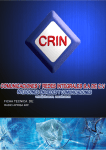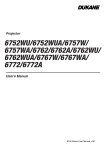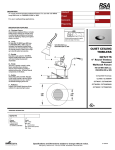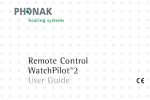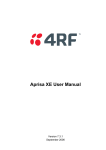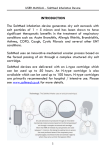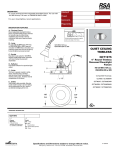Download Aprisa SR+ Datasheet FCC IC English
Transcript
FCC and IC licensed bands Datasheet SMART, SECURE POINT-TO-MULTIPOINT RADIO 220 MHz, UHF and 900 MHz licensed bands The Aprisa SR+ in brief • 220 MHz, UHF and 900 MHz licensed bands and IEEE 802.3 protocols • RS-232 with multiple port options selectable 12.5 kHz, 25 kHz • Software and 50 kHz channel sizes Smart, secure, industry-leading speed licensed point-to-multipoint SCADA communications for industrial monitoring and control for the electricity, water, oil and gas industries capacity: to meet the growing number of data-intensive applications in the SCADA environment, the • High Aprisa SR+ provides data rates of up to 216 kbit/s in 50 kHz licensed channels. with its defense in depth approach, including AES encryption, authentication, address filtering and • Secure: user access control, the Aprisa SR+ protects against vulnerabilities and malicious attacks. the Aprisa SR+ supports multiple serial and Ethernet interfaces in a single, compact form • Future-proof: factor, and is standards-based for long term incorporation into SCADA networks while protecting the legacy investment in serial devices. L2/L3 capabilities: selectable L2 Bridge or L3 Router modes, with VLAN, QoS and filtering • Advanced attributes to support narrow bandwidth channels and mission critical traffic while meeting increasing security and IP network policy requirements. the Aprisa SR+ integrates into a range of network topologies, with each unit configurable • Adaptable: as a base station, repeater or remote station; connect multiple RTUs / PLCs to a single radio. interfaces: the data interfaces can be configured for serial or Ethernet operation; a range • Flexible of options are supported, including two serial and two Ethernet, one serial and three Ethernet, or four Ethernet ports. efficiency: Adaptive Coding Modulation (ACM) and forward error correction maintains the integrity • Link of the wireless connection while an effective channel access scheme and IP routing ensures efficient transfer of data across the Aprisa SR+ network. and robust: the Aprisa SR+ requires no manual component tuning and maintains its high power • Reliable output and performance over a wide temperature range. managed: an easy to use GUI supports local element management via HTTPS and remote element • Easily management over the air, and SNMP support allows network-wide monitoring and control via a third party network management system. • Full and half duplex operation • Single or dual frequency • Gross data rates greater than 200 kbit/s • 256, 192 or 128 bit AES encryption • Adaptive coding modulation: QPSK to 64 QAM • Advanced forward error correction selectable dual / single antenna • Software port operation • Transparent to all common SCADA protocols • Dedicated alarm port • Protected station option • Power optomized option • –40 to +70 °C operational temperature • 210 mm (W) x 130 mm (D) x 41.5 mm (H) • FCC and IC standards compliant integrates with Aprisa XE • Seamlessly point-to-point radio Aprisa SR+ applications Applications throughout the electricity grid and renewable energy: grid: concentrator communications • Smart and GPRS replacement • AMI / AMR: high density data concentrator backhaul • Renewables: wind farm, tidal, hydro automation control and protection • Measurement, in MV / HV distribution / transmission and community energy storage • Co-generation monitoring and control in distributed storage and generation substitution in substation and feeder • Fibre automation upgrades FCC and IC licensed bands Datasheet SYSTEM SPECIFICATION GENERAL SECURITY NETWORK TOPOLOGY Point-to-multipoint (PMP), Repeater DATA ENCRYPTION 256, 192 or 128 bit AES NETWORK INTEGRATION Serial and Ethernet (router or bridge mode) DATA AUTHENTICATION CCM PROTOCOLS INTERFACES ETHERNET IEEE 802.3, 802.1d/q/p SERIAL Legacy RS-232 transport WIRELESS Proprietary SCADA Transparent to all common SCADA protocols such as Modbus, IEC 60870-5-101/104, DNP3 or similar RADIO FREQ BAND TUNING RANGE TUNE STEP FREQUENCY RANGE 220 MHz 215 – 240 MHz 3.125 kHz 220 MHz 215 – 240 MHz 2.5 kHz 400 MHz 400 – 470 MHz 6.25 kHz (Note 7) 450 MHz 450 – 520 MHz 6.25 kHz 896 MHz 896 – 902 MHz 6.25 kHz 928 MHz 928 – 960 MHz 6.25 kHz CHANNEL SIZE 12.5 kHz, 25 kHz and 50 kHz software selectable DUPLEX Single frequency half-duplex Dual frequency half-duplex Dual frequency full-duplex (Note 4) FREQUENCY STABILITY ± 1.0 ppm FREQUENCY AGING < 1 ppm / annum TRANSMITTER AVERAGE POWER OUTPUT (Note 1) 64 QAM 0.01 – 2.5 W (+10 to +34 dBm, in 1 dB steps) 16 QAM 0.01 – 3.2 W (+10 to +35 dBm, in 1 dB steps) QPSK (Note 3) 0.01 – 5.0 W (+10 to +37 dBm, in 1 dB steps) 2, 3 or 4 port RJ45 10/100Base-T switch (specified at order) SERIAL 2, 1 or 0 port RJ45 RS-232 (specified at order) Additional RS-232 / RS-485 port via USB converter (optional) MANAGEMENT 1 x USB micro type B (device port) 1 x USB standard type A (host port) 1 x Alarm port RJ45 ANTENNA 2 x TNC 50 ohm female Software selectable single or dual port operation LEDs Status: OK, MODE, AUX, TX, RX Diagnostics: RSSI, traffic port status TEST BUTTON Toggles LEDs between diagnostics / status PRODUCT OPTIONS DATA PORT CONFIGURATION 2 x Ethernet ports + 2 serial ports 3 x Ethernet ports + 1 serial port 4 x Ethernet ports POWER OPTOMIZED Providing optomized power and sleep mode PROTECTED STATION Providing hot-swappable / hot-standby redundant hardware switching POWER INPUT VOLTAGE < –60 dBc TRANSIENT ADJACENT CHANNEL POWER < –60 dBc SPURIOUS EMISSIONS < –37 dBm ATTACK TIME < 1.5 ms RELEASE TIME DATA TURNAROUND TIME 10 – 30 VDC (13.8 V nominal) RECEIVE STANDARD < 7 W POWER OPTOMIZED < 3 W in active receive state 4-CPFSK 0.01 – 10.0 W (+10 to +40 dBm, in 1 dB steps) ADJACENT CHANNEL POWER < 2 W in idle receive state, < 0.5 W in sleep mode TRANSMIT 210 mm (W) x 130 mm (D) x 41.5 mm (H) 8.27” (W) x 5.12” (D) x 1.63” (H) < 0.5 ms WEIGHT 1.25 kg (2.81 lbs) < 2 ms MOUNTING Wall, Rack or DIN rail 12.5 kHz 25 kHz 50 kHz ENVIRONMENTAL max coded 64 QAM –103 dBm –99 dBm –96 dBm OPERATING TEMPERATURE –40 to +70 ˚C (–40 to +158 ˚F) max coded 16 QAM –110 dBm –107 dBm –104 dBm HUMIDITY Maximum 95 % non-condensing max coded QPSK –115 dBm –112 dBm –109 dBm MANAGEMENT & DIAGNOSTICS min coded 4-CPFSK –113 dBm –110 dBm –107 dBm LOCAL ELEMENT > –47 dBm > –37 dBm > –37 dBm [> 48 dB] [> 58 dB] Web server with full control / diagnostics Partial diagnostics via LEDs and test button Software upgrade from PC or USB flash drive REMOTE ELEMENT Over-the-air remote element management with control / diagnostics Network software upgrade over-the-air NETWORK SNMPv2 and SNMPv3 security support for integration with external network management systems ADJACENT CHANNEL SELECTIVITY (Note 2) CO-CHANNEL REJECTION max coded QPSK [> 58 dB] > –10 dB CO-CHANNEL REJECTION max coded 64 QAM > –20 dB INTERMODULATION RESPONSE REJECTION > –35 dBm [> 60 dB Note 2] BLOCKING OR DESENSITISATION > –17 dBm [> 78 dB Note 2] SPURIOUS RESPONSE REJECTION MODEM GROSS DATA RATE < 35 W MECHANICAL DIMENSIONS RECEIVER SENSITIVITY (BER < 10-6) ETHERNET COMPLIANCE > –32 dBm [> 63 dB Note 2] 135 / 400 / 450 MHz Bands 220 / 896 / 928 MHz Bands 12.5 kHz 25 kHz 12.5 kHz (6) 25 kHz 50 kHz 64 QAM 54 kbit/s 96 kbit/s 60 kbit/s 96 kbit/s 216 kbit/s 16 QAM 36 kbit/s 64 kbit/s 40 kbit/s 64 kbit/s 144 kbit/s 32 kbit/s 72 kbit/s QPSK 18 kbit/s 32 kbit/s 20 kbit/s 4-CPFSK 9.6 kbit/s 19.2 kbit/s 9.6 kbit/s 10.7 kHz 19.8 kHz 11.8 kHz OCCUPIED BANDWIDTH RF FCC CFR47 Part 24 / 90 / 101, IC RSS 119 / RSS 134 FCC IDs UIPSQ400M131, UIPSQ450M140 IC ID 6772A-SQ400M131 EMC FCC CFR47 Part 15, EN 301 489 Parts 1 & 4, ICES-003 IEEE 1613 (Note 5) SAFETY EN 60950 Class 1 div 2 for hazardous locations ENVIRONMENTAL ETS 300 019 Class 3.4 Ingress Protection code IP51 19.2 kbit/s 38.4 kbit/s 19.8 kHz 43.0 kHz FORWARD ERROR CORRECTION Variable Reed Solomon plus convolutional code ADAPTIVE BURST SUPPORT Adaptive FEC with Adaptive Coding Modulation Notes: 1. The Peak Envelope Power (PEP) at maximum set power level is +41 dBm. 2. The receiver figures are shown in typical fixed interference dBm values and dB values [in brackets] relative to the sensitivity. Relative values are given for QPSK modulation and max coded FEC. Refer to the Aprisa SR+ User Manual for a complete list of modulation and coding levels. 3. Please consult 4RF for availability. 4. Full duplex channel access for point to multi-point available in a future software release. 5. The Aprisa SR+ has been successfully evaluated against the requirements of IEEE 1613 for class 1 performance criteria. 6. The gross data rate for the 12.5 kHz channel size in the 896 / 928 MHz bands varies with regulatory compliance. 7. The 450 MHz band is only available for FCC. ABOUT 4RF Operating in more than 130 countries, 4RF provides radio communications equipment for critical infrastructure applications. Customers include utilities, oil and gas companies, transport companies, telecommunications operators, international aid organisations, public safety, military and security organisations. 4RF point-to-point and point-to-multipoint products are optimized for performance in harsh climates and difficult terrain, supporting IP, legacy analogue, serial data and PDH applications. Copyright © 2015 4RF Limited. All rights reserved. This document is protected by copyright belonging to 4RF Limited and may not be reproduced or republished in whole or part in any form without the prior written consent of 4RF Limited. While every precaution has been taken in the preparation of this literature, 4RF Limited assumes no liability for errors or omissions, or from any damages resulting from the use of this information. The contents and product specifications within it are subject to revision due to ongoing product improvements and may change without notice. Aprisa and the 4RF logo are trademarks of 4RF Limited. For more information please contact EMAIL [email protected] URL www.4rf.com Version 1.6.0


